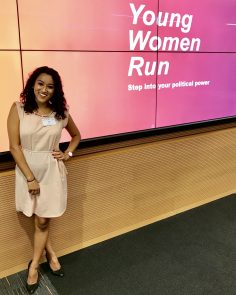Abortion rights, women of color, and LGBTQIA+ people are under attack. Pledge to join us in fighting for gender justice.
Building Communities Beyond Political Divides

 Make sure you only have daytime coffee and politely refuse evening dinner. As a young woman starting your professional career, you will be subject to sexual advances beyond your control, your job is to politely reject them. This was just some advice given to me by well-meaning mentors with clear implications. Last summer, I took the advice. This summer, I became angry. At the Young Women Run Conference, I realized that I didn’t have to be angry alone.
Make sure you only have daytime coffee and politely refuse evening dinner. As a young woman starting your professional career, you will be subject to sexual advances beyond your control, your job is to politely reject them. This was just some advice given to me by well-meaning mentors with clear implications. Last summer, I took the advice. This summer, I became angry. At the Young Women Run Conference, I realized that I didn’t have to be angry alone.
I attended a two-day conference hosted by IGNITE National and Running Start last week – this conference brought together politically ambitious young women of all backgrounds, connecting us to each other and role models we could emulate. While workshops on campaign finance allowed me to practically plan my future career, my conversations with young women allowed me to build a community.
Past our political differences, young women across the United States shared similar experiences of feeling invisible and being made to believe that we weren’t good enough to be politicians, CEOs, or advocates for our communities. I spoke to women who faced uncomfortable advances from men in networking receptions, men who promised them jobs in lieu of implicit sexual advances. Another woman spoke about how she dealt with racist comments as a Black woman running for office. For women of color and LGBTQ women, we have even more barriers of racism, sexism, xenophobia, and homophobia that prevent us from occupying leadership positions.
When women only occupy 19 percent of Congress, 16.3 percent of chief executive offices, and 5 percent of tech startups, conferences like these are pivotal to ensuring that young women can connect to resources to break down these barriers and pursue our passions without fear of retaliation. Connecting with role models who look like us empower each of us to use own power to transform our communities and address sexist remarks, whether it be from a colleague, constituent, or the President. Although from two sides of the political aisle, hearing both Congresswomen Nancy Pelosi and Congresswoman Susan Brooks relay similar messages about facing toxic masculinity and sexism when running for office or in Congress further connected us beyond such political divides. Hostile threats of physical violence received by Senator Susan Collins and Lisa Murkowski for their stances on the recent health care repeal bill mirror the retaliation often faced by women who speak out in the workplace. Nevertheless, both women persisted, united by their desire to serve people over their party – showing young women everywhere that we too have power to do that.
However, while leading organizations like She Should Run, Vote Run Lead and Higher Heights focus on supporting women who run for office through established institutions, we should also support young women who use their voice to speak out against it. Building a pipeline of women in leadership positions is a step in changing power dynamics that contribute to a sexist culture, but we must also support policies that allow all women to access these opportunities. After this summer, I know that I won’t politely ask for leadership positions, I’ll fight for and demand them.
